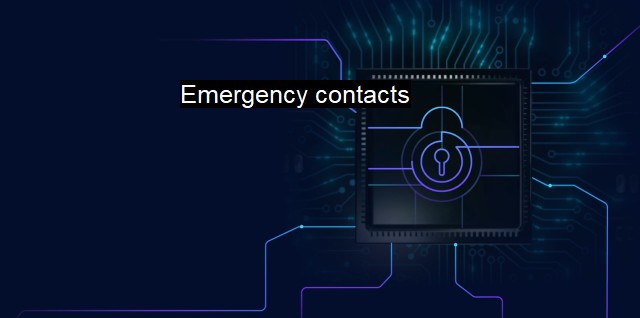What are Emergency contacts?
Redefining Emergency Contacts: The Importance of Digital Security in Modern Society
"Emergency contacts" is a term that traditionally refers to individuals who can be reached in case of an unexpected or urgent situation. In the context of cybersecurity and antivirus measures, "emergency contacts" bears a somewhat similar connotation. It gravitates towards aspects of networks, solutions, and personnel that are at the helm to handle and mitigate issues pertaining to cybersecurity threats and instances of virus or malware attacks.Understanding the intrinsic features of emergency contacts involved in cybersecurity can be comprehended better from a two-fold perspective. One is in the form of emergency solutions and applications, and the other is personnel designated to address cyber emergencies.
Firstly, in the cybersecurity landscape, "emergency contacts" may signify systems or software that are programmed to counteract cyber threats. They could be antivirus software, which immediately swings into action at the onset of virus or malware infiltration. Such software continuously scans and monitors data within a computer or a network to identify potential threats. Once a suspected file or program is detected, the antivirus software acts as an emergency contact to neutralize the potential threat by either quarantining the suspected file or completely deleting it from the system. This immediate response aids in preventing the spread or multiplication of the virus, thereby safeguarding system's integrity.
Further, firewall, another critical "emergency contact," acts as a protective shield against unauthorized network access. It scrutinizes incoming and outgoing network traffic based on pre-established security rules, thus permitting or stopping data packets from entering or exiting the network. It essentially prevents hackers or malicious applications from invading the network and undermines the risk of potential data theft, unauthorized usage, alterations, or even complete system blackouts.
Secondly, from a human standpoint, "emergency contacts" in cybersecurity imply a set of individuals or teams who are at the frontline to encounter cyber threats. It includes system or network administrators, cybersecurity experts, risk assessment and management professionals, incident response teams, etc. These individuals are equipped with a broad gamut of skills ranging from risk identification to solution implementation and possess the power to swiftly respond to any cybersecurity related emergencies. They are responsible for carrying out risk assessments, devising and implementing security protocols, incident handling, and escalating the issue to higher authorities if it surpasses defined thresholds.
An integral part of an organisation's incident response plan, these designated "emergency contacts" are on call 24/7. They play an indispensable role, right from resolving minor software glitch to countering sophisticated security breaches. Their tasks span across blocks identifying the issue, isolating affected systems, driving mitigation strategies, examining causes, logging, and documenting the incident, and finally restoring system operations to normalcy.
Unsurprisingly, they make up the backbone of an organization's cybersecurity structure; their rapid responsiveness, proficient troubleshooting, and security foresight directly aid in maintaining the integrity, confidentiality and availability of systems data. These contacts are an organization's first resort in the wake of a cyber emergency and a critical line of defense protecting sensitive data.
"emergency contacts" in the sphere of cybersecurity and antivirus have a versatile role, combining systems, applications, and individuals. Both system and human emergency contacts are quintessential for an effective approach to cybersecurity, ensuring robust threat detection, swift action, and minimization of potential damages. They distinctively signify digital protection in times of cyber emergencies, thus resonating with the term's traditional sense with some technical dimensions. As cybersecurity evolves with ever-increasing complexities of threats, these "emergency contacts" will undoubtedly continue to play a crucial role in safekeeping organizations against intensifying cyber threats.

Emergency contacts FAQs
What are emergency contacts in the context of cybersecurity and antivirus?
Emergency contacts in cybersecurity and antivirus refer to the individuals or organizations that you can contact during an emergency situation related to the security of your computer or network. These contacts are typically designated in advance and should be easily accessible when needed.Why is it important to have emergency contacts for cybersecurity and antivirus?
Having emergency contacts for cybersecurity and antivirus is important because it ensures that you have a plan in place for responding to emergencies such as malware attacks, data breaches, or other security incidents. These contacts can provide you with guidance and support during the incident and help to minimize the damage caused.Who should I choose as my emergency contacts for cybersecurity and antivirus?
Your emergency contacts for cybersecurity and antivirus should be individuals or organizations that have expertise or experience in dealing with security incidents. This may include IT professionals, security consultants, or even law enforcement agencies. It is important to choose contacts who are trustworthy, reliable, and available when needed.How should I communicate with my emergency contacts for cybersecurity and antivirus?
You should establish a communication plan with your emergency contacts for cybersecurity and antivirus in advance, including contact information and preferred communication methods. This may include phone, email, or messaging apps. It is important to ensure that you have multiple ways of contacting your emergency contacts in case one method is not available during an emergency.| | A | | | B | | | C | | | D | | | E | | | F | | | G | | | H | | | I | | | J | | | K | | | L | | | M | |
| | N | | | O | | | P | | | Q | | | R | | | S | | | T | | | U | | | V | | | W | | | X | | | Y | | | Z | |
| | 1 | | | 2 | | | 3 | | | 4 | | | 7 | | | 8 | | |||||||